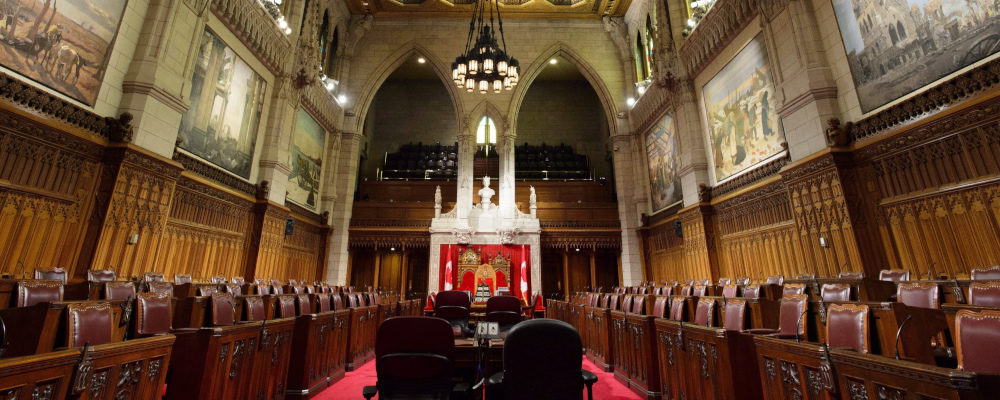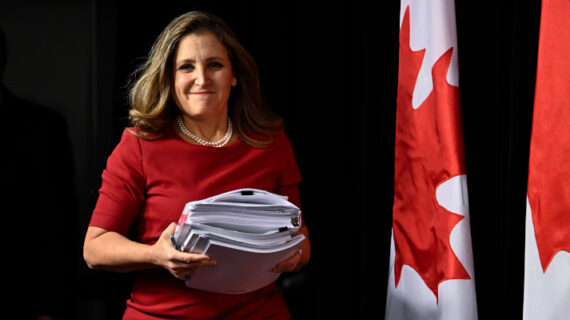I don’t recall ever ordering and reading a book by an academic in order to write a column, but I did for this one, and am glad I did.
Emmett Macfarlane, a political scientist at the University of Waterloo, has written a short, accessible and extremely readable (all kind of rare for academic books) book on the Senate, Constitutional Pariah: Reference re Senate Reform and the Future of Parliament. The book covers Stephen Harper’s Supreme Court reference case on the Senate and the subsequent changes to the appointment process made by Prime Minister Justin Trudeau.
If you care about Canadian politics and institutions, you should read this book.
Macfarlane introduces and concludes the book with an extremely bold claim, namely that the Senate reference “contributed to the most significant reform of the Senate — arguably even Parliament — in Canadian history.”
I couldn’t agree more.
Two pages later, Macfarlane renders judgment, writing that Trudeau’s reforms, a “‘merit-based, non-partisan appointment process, had the twin virtues of good policy and good politics.”
I couldn’t disagree more, though I will continue to rely on his book to explain why.
Macfarlane lays out three roles for the Senate envisioned by Canada’s constitutional framers. First and foremost, it was to be a “chamber of ‘sober second thought,’ with the upper house intended to act as and independent check on the worst impulses of the popularly elected lower house, and especially cabinet.”
Second and third, the Senate should be a “defender of minority rights and a protector of private property.” Let’s dispense quickly with these two so we can return to the first. As Macfarlane notes, the Senate’s role as a protector of minority rights has arguably been superseded by the “role of the courts in the period since the Canadian Charter of Rights and Freedoms.” I could make an argument that this Americanization of the Canadian constitution was a step backwards, but that’s for another day.
The role as protector of private property, or business interests, “has all but vanished from contemporary discourse,” Macfarlane correctly notes. I could make an argument that severely curtailing the role of corporations in the political process by eliminating their ability to donate to political parties might make it worth thinking about returning such a role to the Senate, but that’s also for another day.
Which takes us back to “sober second thought.” Macfarlane quotes an early Senate scholar who notes that the constitutional founders were motivated by a “deeply rooted conservatism.” I think that’s right. And it’s the opening I need to go on a bit of a lengthy Hayekian detour.
Hayek’s theory of spontaneous order
Friedrich Hayek’s thinking is at the root of much of modern conservative thought, even if Hayek never considered himself a conservative in his own day. Hayek summarized his central and profound insight, albeit in anachronistic language, in his last book, The Fatal Conceit, as follows:
“Man became intelligent because there was tradition — that which lies between instinct and reason — for him to learn. This tradition, in turn, originated not from a capacity to rationally interpret observed facts but from habits of responding.“
Fans of Hayek recognize that the process by which tradition emerges is not something that is planned, but rather comes from what Hayek called “spontaneous order.” Society and our institutions do not emerge from our plans or our wisdom, but from a long history of individuals responding habitually that collectively produces institutions and traditions.
And while Hayek argues that without these traditions “the extended order of civilisation could not continue to exist,” he also adds, “I do not claim that the results of group selection of traditions are necessarily ‘good.’”
So while the traditions and institutions stemming from spontaneous order are necessary for the functioning of society, some of those spontaneously emerging traditions and institutions are wrong — or worse — and need to be corrected. We have seen many of these corrections in my lifetime that are good and proper and necessary, such as shifts in the the roles and treatment of women and minorities. Over time our individual habits of responding can change which can then lead to collective changes to our traditions and institutions.
These insights underpinned Hayek’s deep suspicion about our ability to know, understand and predict or plan using social science in the same way we can know, understand and predict or plan using the physical sciences. Hayek co-won the fifth ever Nobel prize in economics for “pioneering work in the theory of money and economic fluctuations and for their penetrating analysis of the interdependence of economic, social and institutional phenomena.” In his Nobel banquet speech Hayek famously said he wished the Nobel Prize for Economics had never been created because it would tempt economist to put their insights and research on the same level as those in the physical sciences. Or as Hayek put it, the “Nobel Prize confers on an individual an authority which in economics no man ought to posses.”
Hayek applied the insights of spontaneous order and the need for humility to the design of institutions of government in a three volume series titled “Law, Legislation and Liberty.” Relevant to our discussion, he proposes a bicameral legislative structure where one house would be entrusted with “the task of stating the general rules of just conduct to a representative body distinct from the body entrusted with the task of government.”
The former, the upper house would therefore “serve the formation and preservation of an abstract order” while the latter, the lower house would be concerned with “the achievement of particular concrete purposes… and provisions intended to known to affect principally particular identifiable individuals or groups.”
In short, a lower house to run government and an upper house to preserve, moderate or change tradition.
Hayek proposes that the lower house be elected popularly in regular elections by competing political parties that lay out “agreed aims” and “particular programs and actions” that “compels the individual member to submit to party discipline” in order to get re-elected. Much as we have today.
Hayek then lays out a fascinating, if likely unworkable (and in the Canadian context likely unconstitutional) method for choosing members of the upper house. He proposes “an assembly of men and women elected at a relatively mature age for fairly long periods.” Specifically, he proposes annual elections so that once in their lifetime, “in the calendar year in which they reached the aged of 45” voters of that age would “select from their midst representatives to serve for fifteen years.” So there would be a fixed number of individuals from each age cohort between 45 and 60 sitting in the upper house. Hayek proposes that these elections be free from partisan influence.
How to build a functioning upper house
Hayek is clear that his purpose in designing these models is less that they be replicated exactly, but rather that such models make his underlying principles clearer. I take the following three underlying principles from Hayek’s model.
First, the upper house ought to be primarily concerned with the broad rules underlying society — our traditions, to use Hayekian vocabulary. It ought to be humble and therefore reluctant to radically or quickly change or alter those traditions, particularly in response to pleas from the lower house to do so.
Second, the upper house ought to have some connection to popular support… even if relatively weak. In Hayek’s formulation that means voting once in your lifetime (assuming you live to 45) for a group your age to serve for fifteen years. I find his proposal intriguing, but likely unworkable. But the insight is sound — there ought to be some democratic legitimacy to upper house members.
Third, members of the upper house ought to be accomplished. They should have accomplished something in life and have the experience to show for it. We should look for the upper house to be filled with wise people, not smart people, where wisdom is smarts honed by experience.
I would collapse these three principles into a single word: memory. I believe that the Canadian Senate should be a House of Memory. Its members should be old enough to have memories, our best traditions ought to be engrained in their memories, and those memories should be connected not just to their own life experience, but to the broader public will or memory through some sort of democratic mechanism.
And so I understand “sober second thought,” to mean memory, understood in this way.
And in my view, the Canadian Senate prior to Trudeau’s changes was a far superior House of Memory than the Senate is becoming under those changes.
A brake on radical change
Let’s remind ourselves of what the Canadian Senate prior to Trudeau’s changes actually was, because Trudeau’s changes were in a small way presaged by Harper appointing a number of previously non-partisans — including a number of journalists. Before that, the tradition of appointments to the senate were partisan — appointees generally agreed to sit in a partisan caucus, and had strong prior ties to the political party that appointed them. I would go even further and argue that appointments should have relatively close connections to the government in power at the time.
This gets to the first principle above. Senators should be a brake on radical changes. So a government that has been in power for a long time can expect to have a majority in the Senate after it loses power. When a government changes, the Senate can act as a reminder — memory, if you will — of that previous government. As the Canadian Senate demonstrated through much of the twentieth century, such a Senate can refrain from being obstructionist. In particular, if the members of the Senate had been part of the previous government they may even recall having to deal with a hostile Senate in their own early years in power. This will produce a modicum of humility towards being obstructionist.
The experience during the Mulroney years calls this analysis into question. (I thank Macfarlane for pressing me on this issue in private correspondence.) The Liberal Senate of the day was, in historic terms, obstructionist, particularly in their attempts to stop the passage of the GST. Mulroney responded by using an exceptional provision to appoint additional senators to get his way.
I’d argue there are three ways to view the Mulroney episode. The first is that this was partisan obstruction of a legitimately elected majority government that ought not to have happened. But how does that make the argument that our senators ought to be independent? The partisan senators reacted in a somewhat predictable way and were accountable via the opposition caucus for those actions. Independent senators need have no such accountability and could decide for whatever reason they like to obstruct a government action. Seems to me that if you feel this was illegitimate obstruction that doesn’t help your argument to have independent senators. Indeed, due to the lack of an accountability mechanism for independent senators, I would still argue that on balance this makes partisan senators better.
However, in the event, as noted, Mulroney used an exceptional provision to get his way. So the second way to view this is that the senators made a point — a strong one — that these changes went contrary to where the country ought to go, but ultimately the democratic will prevailed. In this sense you could argue that the system worked. Mulroney did bring in some rather substantial changes, the Senate provided a check on those changes, but the democratic will ultimately prevailed. Again, this hardly seems like an argument in favour of independent senators.
The third way to view this is that the senators were just doing their Hayekian jobs — pointing out that these changes to our traditions were large enough and worrying enough to warrant their intervention. Whether they were correct or not can be argued (and I am ideologically sympathetic to what Mulroney was doing), but if that was their judgment, we should accept it. And even if on balance they were incorrect to try stop Mulroney, I would argue that this episode functioned as a helpful public reminder of the proper role of the Senate — to act as a brake for overly ambitious new governments. A little muscle flexing, if you will. And again, Mulroney ultimately got his way, so it really is legitimate to think of it as muscle flexing.
The untethered non-partisan senator
Another advantage of appointing partisan senators with connections to the government in power (or formerly in power) means those appointed will not be on their first tour of duty within the governing apparatus. They will have had a chance at implementing their democratically approved agenda.
Such is not the case with “merit-based, non-partisan” appointments. For nearly all of them, the Senate will be their first tour of duty in government. Their temptation to proactively legislate will be all the more higher as “short of introducing money bills, the Senate’s formal powers are effectively equal to those of the House of Commons,” as Macfarlane notes. By definition, merit-based, non-partisan senators will get their first shot — for most their only shot — at making legislative changes via their appointment. They will be tempted to look forward, not back. Their focus will almost certainly be their dreams, not their memories.
And this risk is even more pronounced when you consider that these meritorious senators lack any sort of democratic mandate or partisan affiliation that would otherwise discipline their actions. Who, once the prime minister that appointed them is gone, do they owe loyalty to beyond themselves? Why would they have any incentive to be humble in their legislative aspirations? Other than proactively spend money (though they do have the power “to reduce the amounts” in budget supply bills and can hence could theoretically block a budget) they have absolute legislative power. Do we want folks with such power to lack any democratic legitimacy?
I don’t.
Partisan senators have two democratic links. First, they have a linkage to the government that appointed and in which, on my preferred mode of appointment, they will have close ties to. Second, they remain tethered to that party by sitting in their caucus. That party will presumably continue to have a realistic opportunity to win another democratic mandate. Although meritorious senators arguably have some linkage to the government that appointed them, the fact that they are untethered to a political party means that linkage is immediately, and permanently, broken. Once appointed, we strip away any vestige of democratic legitimacy from merit-based non-partisan senators.
There are also ways in which independent senators reduce the overall quality of our politics and the wisdom of our politicians. In the first place, it will make the recruitment of accomplished and wise lower house candidates more difficult. Why would accomplished and wise folks be willing to let their name stand in a partisan election rather then just telling a party that approached them to, “let me know when you win, and I’ll serve in the Senate.”
Or to be concrete, would Paula Simons or Peter Harder be any less impressive Senators had they first ran for the Liberals (or Conservatives), or perhaps served in some capacity for the Liberal (or Conservative) government before being appointed? I think not. But by doing these things first they would elevate the quality of people in such jobs — whether front room or back — which would improve the quality of our partisan politics and our governments.
Another point on partisanship, this time from Macfarlane, who writes, “one issue is the perception that many, if not all, of the senators appointed under the new process are Liberals in all but name… The real test of this will be when there is a change in government,” and whether these new senators act as partisans even if they are called independent. I think the problem here goes beyond asking what the point of this entire charade was. That’s because this would create a situation where real Liberals will have created a powerful, semi-permanent set of independent Liberals who can pursue the Liberal agenda utterly untethered to anything. A roving band of unaccountable, unelected and extremely powerful Liberals, er, liberals.
The diminished member of parliament
I see another downside to turning what was once partisan independent. The more we remove duties and responsibilities from elected (or unelected) partisan members of government and give them to independent officers or senators, the more we will elect Members of Parliament who are merely performative simpletons rather than serious legislators.
Every time another part of the role of Members of Parliament or political parties gets usurped by making it “independent” the less there is for parliamentarians and partisans to do. This applies to rapidly expanding budgets for Auditor Generals, the creation of Parliamentary Budget Officers (PBOs), and to making one of our legislative houses — the Senate — independent. It is arguably less the case for other types of independent officers.
A quick personal detour to make my point: When I went to Ottawa for the first time and became Preston Manning’s economic and fiscal policy advisor, I did much of the work that the PBO does today — I wrote economic and policy reports and a shadow 1995 budget — and had a lot of cooperation from the Department of Finance to do so. That work has all shifted from partisan offices to the PBO, to the detriment of the quality of our Opposition who have replaced my old job with support for the performative side of politics — videographers, opposition researchers and social media managers.
There are a myriad of legitimately independent roles in our governments. The bureaucracy itself is massive, there are numerous boards, commissions and other bodies that are properly independent of partisan politics.
We do not lack strong, sensible and sane independent voices within our governments. What we increasingly lack is strong, sensible and sane partisan voices. And we make this worse every time we take a role that is properly the domain of partisan politics and make it independent. Creeping independence of so much of what was formerly partisan is making our partisan politics weaker and our politicians dumber.
Partisan politics is how we settle differences without resorting to broad swords. Differences arise because, as Hayekian humility suggests, we can’t know in every instance what the right way forward is. And as much as we wish to think otherwise, there are numerous legitimate ways forward.
The less our politics accommodates these differences — and the ultimate arrogance of more independence in our politics is that there is only one right way forward — the less we will be able to settle legitimate differences.
I believe that making our partisan politics weaker and our politicians dumber is a key source of rising and dangerous populism, not the result of it. And that is the fundamental reason why I think the Trudeau Senate reforms are not just terrible policy but terrible politics.




